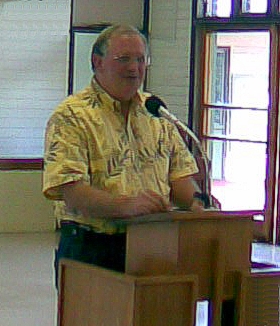July 23 Meeting: David Rolf--Transportation Alternatives for Oahu--Choosing a Plan that Works
 Click
Click In a 30-minute presentation titled "Divided We Rail," luncheon speaker Dave Rolf told of the pitfalls the Honolulu community would face in adopting a multi-billion dollar transportation project without: 1) a clear way to pay for it, and 2) data that shows such a rail plan will indeed reduce traffic congestion. "Honolulu has a traffic problem," Rolf said, "but we are setting up to fail." He pointed out that the City's own study showed the City's heavy rail proposal will result in a level of service of "F" (severe traffic congestion in the Leeward corridor). "It makes little sense to plan for F," he said.
The heavy rail plan may end up with a required $25-30 per rider subsidy when one takes into account the lost use of money from the billions required to build the system. A better alternative is a 3-lane, reversible, elevated highway which could be built over H-1 and paid for by the users through electronically-collected fees.
Like the governor of Texas said recently, "you can have no lanes, slow lanes, or toll lanes." Dallas has had privately funded cross-town expressways for years. Rolf explained the "Rule of Thirty-Five"—the value of a group of 35 citizens logging in with intelligent input on a public policy decision. A podcast carries the full description of another citizen input rule: The Rule of One. He included a quote from J.M. Keynes: "I am sure that the power of vested interests is vastly exaggerated compared with the gradual encroachment of ideas. Soon or late, it is ideas, not vested interests that are dangerous for good or evil."
Apologies for the poor sound for the first 90 seconds.



<< Home